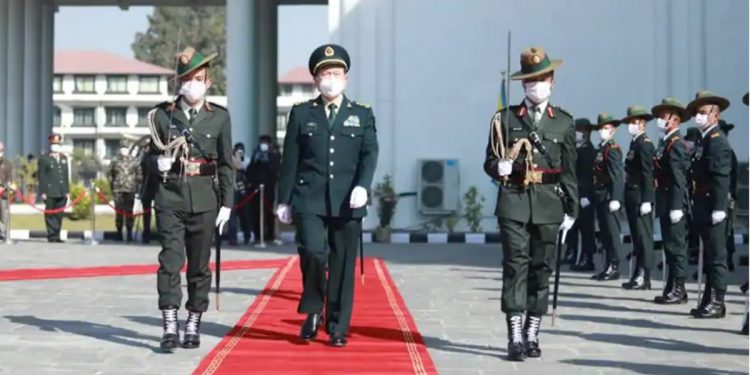It’s no coincidence that both India and China have, by turn, been frantically wooing Nepal this month. Kathmandu has witnessed in the whole of November a tug of war of sorts between its two giant neighbours over getting its attention. First, it was the Indian Army chief General Manoj Mukund Naravane who visited Nepal’s capital and met the country’s political and military leadership. This was followed by a two-day trip by Foreign Secretary Harsh Vardhan Shringla beginning November 26. Soon after the announcement of Shringla’s impending visit, there was media speculation that China’s Defence Minister Wei Fenghe would follow suit even though both Nepal and China pleaded ignorance of such a plan. But, after Shringla had left Nepal, Wei, who is also China’s State Councillor, landed in Kathmandu on November 29 for a day-long stopover and held a flurry of meetings with Prime Minister KP Sharma Oli, who is also the Defence Minister; President Bidya Devi Bhandari and Nepal Army Chief Purna Chandra Thapa before flying straight to Pakistan in the evening. According to reports, Wei’s visit was preceded by the arrival of a three-member high-level Chinese team in Kathmandu on November 24 which is learnt to have had parleys with the leadership of Nepal’s ruling and Opposition parties.
Interestingly, on October 4, Samant Goel, head of India’s foreign intelligence, the Research and Analysis Wing (RAW), had been to Nepal to hold meetings with Oli, Opposition leader Sher Bahadur Deuba and former Prime Minister Baburam Bhattarai.
The spurt in India’s diplomatic overtures to Nepal at a time when a whistleblower MP of Nepal revealed to a UK daily that China has stepped up its military preparations through encroachment of Nepal’s territory brings to the fore the country’s changed foreign policy towards its neighbours primarily due to the BJP government’s emphasis on trying to make Nepal a junior country. Nepal not only changed its Constitution to term itself ‘Secular’ instead of its previous position as a ‘Hindoo nation’ but the Indian reprisal in the form of supporting the Madhesi agitation and blockage of land routes to the mountain country upset the common citizen. The domestic agenda of Hindutva does not seem to have been well received as a foreign policy in the neighbourhood.
Apparently, China has been using to the hilt the border disputes between India and Nepal over the possession of Lipulekh, Kalapani, and Limpiyadhura. Indian Army chief General Naravane angered the Nepalese establishment in May with his suggestion at a think tank-event that Nepal’s protests against India inaugurating a new road that would connect Uttarakhand to the China-India-Nepal trijunction in the Lipulekh pass, were at the behest of China. Nepal claims the new road passes through its territory. In retaliation Nepal approved in June a new political map that showed Lipulekh, Kalapani and Limpiyadhura as part of Nepal. India has traditionally considered these areas to be its own. In November last year Kathmandu had protested against a new political map of India following the reorganization of the erstwhile state of Jammu and Kashmir into two Centrally-controlled territories showing Kalapani as part of India. At that time, Nepal’s Foreign Ministry asserted: “Kalapani is a part of Nepal. The remaining issues related to the border should be resolved in bilateral consensus and any unilateral actions will be unacceptable to the Nepal government.”
During the meeting with Wei, Oli has iterated Nepal’s commitment to ‘One-China’ policy and assured him that Nepalese soil would never be allowed to be used against China, Oli’s foreign relations adviser, Rajan Bhattarai told the media. “The Prime Minister said that Nepal is committed to implementing the agreements reached during the visits of President Bhandari and his to China as well as President Xi Jinping’s to Nepal,” Bhattarai said. Wei, in response, appreciated Nepal’s commitment to ‘One-China’ policy and said Nepal and China share trouble-free relations and are ready to contribute to each other’s development and prosperity.
Curiously, China has already expressed its concern over the sluggish implementation of projects under its Belt and Road Initiative to which Nepal signed up in 2016. China has succeeded in getting Pakistan’s support in this regard when the latter declared early November that Gilgit-Baltistan would be accorded provisional provincial status. This is supposed to facilitate the construction of the strategic road connecting Pakistan and China.
The Chinese team visiting Nepal before Wei is learnt to have talked to the ruling party leadership to underscore China’s keenness to see stability in the country and an end to internal bickering. It wants continuation of the present regime in Kathmandu. It also expressed its displeasure over the Opposition MP’s ‘disclosure’ about Chinese encroachment into Nepalese territory.
When China is trying to make the right noises in Kathmandu backed by its steady military-trade-diplomatic initiatives, India should immediately recalibrate its foreign policy vis-à-vis its neighbours lest China would drive permanent wedges. Recent events point to a very lethargic response from the mandarins at New Delhi. Busy with internal politics and trying to divert attention of the people from miseries of the contracting economy and gross failures of most domestic policies, Indian leaders are observed visiting multiple vaccine producing facilities in a single day while foreign policy adventurism has back fired. The damages inflicted thus will have long-term effects on the way India forges relationship with her neighbours.







































